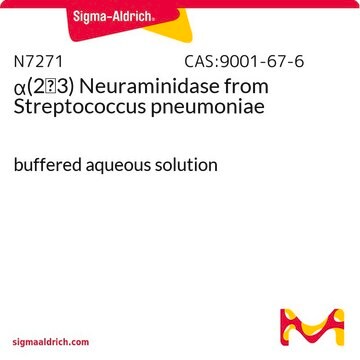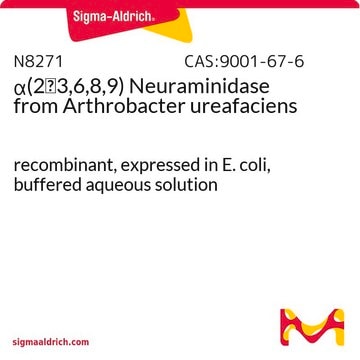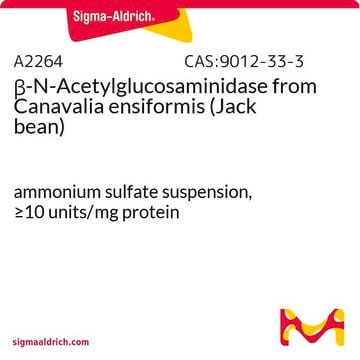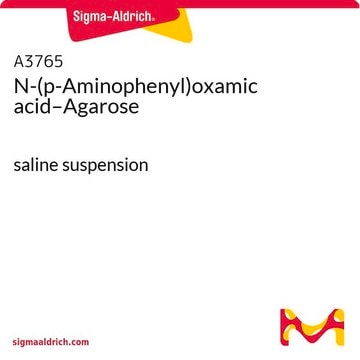N2876
Neuraminidase from Clostridium perfringens (C. welchii)
Suitable for manufacturing of diagnostic kits and reagents, Type V, lyophilized powder
Sinónimos:
Acyl-neuraminyl Hydrolase, Receptor-destroying enzyme, Sialidase
About This Item
Productos recomendados
Quality Level
type
Type V
form
lyophilized powder
specific activity
≥0.1 units/mg solid (using mucin)
≥1.3 units/mg solid (using 4MU-NANA)
application(s)
diagnostic assay manufacturing
foreign activity
Protease and NAN-aldolase, present
shipped in
dry ice
storage temp.
−20°C
Gene Information
Clostridium perfringens str. 13 ... nanI(988807)
¿Está buscando productos similares? Visita Guía de comparación de productos
General description
Application
Biochem/physiol Actions
Unit Definition
One unit will hydrolyze 1.0 micromole of 2′-(4-methylumbelliferyl)-a-D-N-actetylneuraminic acid per minute at pH 5.0 at 37 °C (using 4MU-NANA as a substrate)
Preparation Note
Analysis Note
signalword
Danger
hcodes
pcodes
Hazard Classifications
Resp. Sens. 1
Storage Class
11 - Combustible Solids
wgk_germany
WGK 1
flash_point_f
Not applicable
flash_point_c
Not applicable
ppe
Eyeshields, Gloves, type N95 (US)
Certificados de análisis (COA)
Busque Certificados de análisis (COA) introduciendo el número de lote del producto. Los números de lote se encuentran en la etiqueta del producto después de las palabras «Lot» o «Batch»
¿Ya tiene este producto?
Encuentre la documentación para los productos que ha comprado recientemente en la Biblioteca de documentos.
Los clientes también vieron
Artículos
Understand sialic acid structure, function, signaling, and modifications. Easily find products for sialic acid research.
Understand sialic acid structure, function, signaling, and modifications. Easily find products for sialic acid research.
Understand sialic acid structure, function, signaling, and modifications. Easily find products for sialic acid research.
Understand sialic acid structure, function, signaling, and modifications. Easily find products for sialic acid research.
Protocolos
Enzymatic Assay of Neuraminidase applies to products that have a specification for neuraminidase content by enzymatic determination.
Contenido relacionado
Find protein research tools to prepare, isolate, and analyze proteins. Organized by how to extract, protect, purify, enrich, modify, and quantify proteins.
Find protein research tools to prepare, isolate, and analyze proteins. Organized by how to extract, protect, purify, enrich, modify, and quantify proteins.
Find protein research tools to prepare, isolate, and analyze proteins. Organized by how to extract, protect, purify, enrich, modify, and quantify proteins.
Find protein research tools to prepare, isolate, and analyze proteins. Organized by how to extract, protect, purify, enrich, modify, and quantify proteins.
Nuestro equipo de científicos tiene experiencia en todas las áreas de investigación: Ciencias de la vida, Ciencia de los materiales, Síntesis química, Cromatografía, Analítica y muchas otras.
Póngase en contacto con el Servicio técnico











